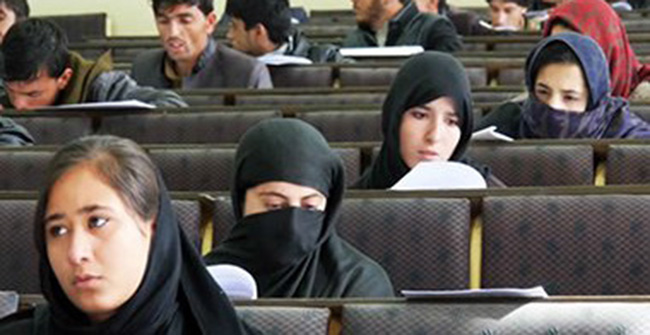Though fighting against violence has been one of the most debated topics since 2001 but it remains one the most serious issue in Afghanistan. It occurs in various forms including physical violence, economic, verbal and psychological violence. The most horrible type of violence is physical violence, especially beating which is imposed on women in a cruel way. The recent case of a 23-year-old Afghan woman – Zarmina - that her husband tied her up and cut off both her ears has shocked the world! The shameful act followed a series of similar events has been happening in preceding years: In January 2016, a young woman, Reza Gul, her nose had been cut off by her husband in the remote Ghormach district of north-western Faryab province. In November 2015, a young woman was stoned to death in Ghor province after she had been accused of adultery. In September 2014, a man cut off part of his wife's nose with a kitchen knife. Thus, a young Kabul woman, Farkhunda, was beaten and burned to death over false allegations. These are just a few examples which revealed maybe there are many cases which have not been reported.
Thus, it is reported by media that Taliban militants have killed at least two women on various charges last week; The Taliban militants executed a pregnant and a girl in northeastern Badakhshan province in an apparent honor killing. It is quoted from local government officials that the pregnant was killed in the residence of her father last week. Provincial governor’s spokesman Ahmad Navid Frotan said the woman had visited her father’s house three days ago in Yamgan district. In the meantime, the provincial government media office in a statement said a young girl was shot dead by the Taliban early on last Wednesday in Khambel Yaftal village.
As aforementioned, there are different types of violence which victimizes women; one of the most serious but less reported is sexual violence against women in Afghanistan. A large number of women and girls become victims of this crime annually. Sexual violence is considered as a taboo in Afghan society. It occurs as sexual assault, uncommon sexual relations, insult and sexual humiliation, forced prostitution, forced abortion, etc. therefore, they try to conceal cases of sexual violence and not to be registered. Sexual assault is the most serious and concerning sexual violence in Afghanistan. In most cases, sexual assault is combined with other type of violence, which usually ends up with the death of the victim.
The other type of violence is verbal and psychological Violence; verbal and psychological violence is the most common type of violence against women, which have received the least attention as violence against women. Such types of violence exert negative effects on the psychology and spirit of the victims. Humiliation, insult, and threat are the common types of violence that, inflect serious negative impacts on the characteristics and spirit of women. Verbal and psychological violence against women may occur at home or public places in the form of harassment on the streets and puts women in a difficult and dangerous situation. However, Violence against women is not limited to the above-mentioned violations. There are several other types which have negative social, cultural and economic effects on the life of Afghan women, affecting health, self-esteem and social status, living conditions and welfare of women, and prevent their development and growth, causing them to be isolated .
Violence against women caused by several factors but some of important factors consist of: failure to deal decisively with the perpetrators, and continuation of culture of impunity ; corruption and abuse of state positions; the involvement of influential people in addressing violence against women, and resolving of cases of violence against women by non-official and informal authorities ; hiding of the crimes and lack of referral to judicial authorities for fear of and mistrust upon government agencies ; lack of proper coordination between judicial authorities (especially the police, prosecutors and courts); women’s limited access to justice (courts, attorney office, female detention centers and lawyers); existence of illegal weapons and illegal armed groups ;lack of security and weakness of state authority in districts and provinces ;lack of necessary support for the victims of violence against women ;considering violence against women as a normal action ; Illiteracy and low levels of public awareness ; Traditional patterns of marriage in Afghanistan ;poverty and unemployment ;Increased drug addiction.
Overall, the current women condition not only indicates a weak justice system but also mirror the depth of a shameful heartbreak which is on contrary to Islamic and humanitarian values. The number of violent cases is undoubtedly greater than what is reflects in the media, but due to lack of trust of on the government practices, especially the law enforcement organs, weak rule of the government in the districts, in remote provinces have caused hopelessness among the victims of violence to launch their cases. On the other hand, there are lots of obstacles in front of human rights observers to document these cases in the remote parts of the country.
In essence, As long as women are uneducated and weak, they will persist to be vulnerable. The weak is more likely to be victimized in the context of Afghanistan. There are numerous Afghan educated women who enjoy their rights better than many men. They can work, study and benefit from domestic rights while the uneducated women are deprived of very basic rights due to their own unawareness. So, the more they are uneducated the more they are victimized. Additionally and given the government commitments, everyone should be aware that we are a member of global community now. Therefore, we need to understand the commonalities between Islamic teaching and humanitarian conventions are more than differences. Even the general spirits are almost the same; it is far more human to stress on commonalities than blackening the face of our nation and culture by cutting the ear or nose of women.

